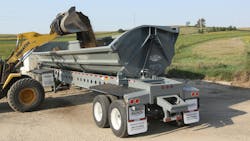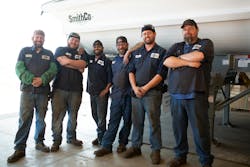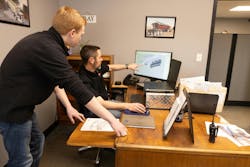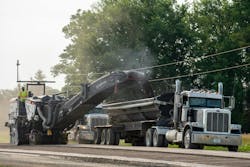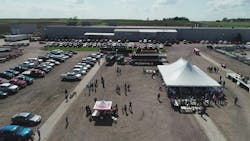SmithCo celebrates 30 years of grit and tenacity
Three decades is a long time to be in business, whether as a donut shop or a trailer manufacturer. SmithCo Inc. would know, as the construction, agriculture, demolition, and mining trailer manufacturer celebrated its 30th anniversary this year.
Scott Lovell, president and CEO of SmithCo, has been with the organization for 24 of those 30 years, and has seen it survive thanks to its tenacity and devotion to solving customers’ problems, even during its humble origins and lean times.
“We are in business with the person that buys our trailer,” Lovell said. “If they’re not profitable and they’re not happy, then we’re not satisfied. In the end, their success means we’re successful, and you build upon that, one person at a time, one trailer at a time.”
Starting small
Greg Smith started SmithCo in 1994 as a man with an idea: To help the construction industry have a side dump trailer that met the Federal Bridge Formula while also eliminating the potential for end dump trailer tip-over. So, that’s what he did, leasing his first manufacturing facility with only three other employees.
“[Smith] relied on key people that he had identified as trustworthy, honest, and had good ideas,” said Duane Myears, district sales manager with SmithCo. “These were people that thought through problems and came out with a solution.”
And while they only made three trailers in their first year, Smith’s chosen people kept solving problems and growing the company, until by 1997, SmithCo was ready for a bigger facility. Luckily, there was a parcel of land just south of where the original building was, Lovell related, and once the company bought it, work started on a larger facility in 1998, and SmithCo moved into its new home in November 1999.
Now, production had grown from three trailers in a year to 250, and while SmithCo had kept the dedication and adaptability of a company powered by four people, its organization and structure had to catch up to its growing size and productivity. In 2000, Smith hired both Lovell and Myears, building out the team needed to support the 80 or so workers who ran the lines to produce roughly four to five trailers a week.
“There was a core group that had been with Greg for four or five years that really knew what to do,” Lovell recalled. “There was a lot of institutional knowledge, but not a lot of process and procedures. People needed direction.”
This was especially true at SmithCo, where that core team started out so small that everyone wore multiple hats, drawing on their institutional knowledge and experience when applying themselves to every task.
“The guys that welded the trailers when this place first started were the same guys that painted it, they were the same guys that put the electrical and hydraulic stuff into it,” Lovell explained. “As they grew, they had to compartmentalize the company and the process, and they grew so fast that the process and procedures never kept up with the growth of the company.”
But just as the new millennia saw SmithCo start to grow beyond a small, scrappy company into a well-oiled machine, 2001 ushered in a host of new changes, not all of them good. The economy struggled after the September 11 attacks, with the trailer industry and SmithCo feeling these ramifications as well.
“It got really, really tough,” Lovell remembered. “Within my first year and a half, I ended up having to lay off two thirds of the employees because of the major downturn in the economy.” But SmithCo never gave up. Even with their reduced staff, those that remained used that time to streamline their new processes and increase their efficiency, preparing them to take off again once the economy rebounded.
And rebound it did—Nowadays, SmithCo can produce over 500 trailers per year and focuses not just on efficiency, but on providing their customers exactly what they need and when they need it.
“One thing we do is we pay attention to our customers, including their wants and their needs,” Myears stated. “If you ever have an issue, let us know. It’s the only way that we can stay at the forefront and say that we’re the best. We need to know what’s happening and we take care of it.”
“Our slogan is, we don’t build trailers, we build solutions,” Lovell agreed. “Our solutions are in the form of a trailer, but we have many different models that are suited for specific applications and markets that our competitors can’t get into because they only build one type of trailer.”
This includes the ability to modify trailer lengths per inch to maximize payloads, Lovell noted, and working with a customer to tailor their ideas and requests to make them the best they can be.
“Sometimes we have to protect the customers from themselves because their idea is too far out there,” Lovell said.
But once that spark is fine-tuned between SmithCo and their client, the company also examines whether the idea is applicable to the wider base of their constituents.
Read more: SmithCo adds dealers in Minnesota, Wisconsin, Arizona
“If we build [a trailer] for just one person, it doesn’t make a lot of sense,” Lovel explained. “But does it have a potential market that we’re going to fulfill? That’s really the genesis of every different model that we have right now.”
It’s this kind of creativity and scalability that helped keep SmithCo afloat during the lean times, Myear noted.
“It’s not just selling a trailer out of the box,” the district sales manager stated. “We were willing to build a guy what he wanted and try something new. It kept the business going when the markets were way down.”
Creating for the cold
One example of this ingenuity was the work SmithCo did with Baffinland Iron Mines. The Canadian company mines iron ore, and they approached SmithCo between 2009 and 2010 needing trailers to withstand the harsh environment north of the Arctic Circle. It took SmithCo until 2013 to finalize the Baffinland trailer design.
The problem was the sheer size of the trailers, which required a six-inch axle that was not the typical tube, but a solid bar. This required a manufacturer who could make a suspension that was able to bear that kind of load even before the trailer was filled, not to mention stand up to the frigid cold.
“Nobody had ever built equipment that was going to work around the clock, 365 days a year that far North in subarctic conditions,” Myears said. “Typically, the world stops working at minus 40 degrees. [Baffinland was] at negative 80 and wanted to keep running.”
This included finding the proper materials to withstand those extreme temperatures. Then, of course, once the trailer design was completed, it needed to be stress tested and adapted based on the company’s daily working conditions.
“We had to research different steel types and how they reacted to that kind of cold, and then how to weld that material for that cold,” Lovell related. “For the shield gas for the welding wire, we had to do a lot of research to figure out the best combinations for where these [trailers] were going.”
But the final result was worth it. By the end of the project, the 10’ wide and 13-14’ tall trailers weighed almost 50,000 pounds empty and were able to haul 75 metric tons apiece. SmithCo supplied Baffinland Iron Mines with trailers for about six years, until the company’s fleet was properly stocked.
“Those trailers are now still running above the Arctic Circle, hauling this iron ore to a port so they can offload it onto ships,” Lovell stated.
Looking ahead
With that kind of project under their belt, SmithCo has gone on to expand, develop more projects, and is currently working to automate certain parts of their facility’s workflow.
“We’ve got an expansion project that we hope to kick off in 2025 to set up a whole new paint line for us that will eventually open up some more steel fabricating capacity,” Lovell noted.
Additionally, SmithCo just redesigned its Light Tipper trailer, which is meant for refuse and demolition products, to make it as “bulletproof” for the customer as possible. The Light Tipper was coming through production during the writing of this article, and SmithCo also recently redesigned its construction pup series for improvements, too.
Beyond this, SmithCo’s foray into full automation has been a good learning experience, Lovell stated. While the company already had some semi-automated processes, fully automated equipment is a different ballgame, and it recently installed its first set of robots.
“It’s a two-robot cell system where the set of gantries move back and forth between different cells, and they’re welding our standard SX tub series,” Lovell explained. “They’re doing a good portion of the welding on those to allow us to use human welders at other places within the plant.”
While this process has been exciting, it hasn’t been without its hiccups, including a longer implementation period than SmithCo first anticipated.
“We had a lot more to learn than we originally were led to believe from a programming standpoint, but it’s already given us the ability to produce more tub dump bodies with fewer people than what we had before,” Lovell said.
And that’s a solution that SmithCo’s president is confident the company needs, as they’re planning to grow to produce 1,200 trailers annually within the next seven years.
“That’s our goal, and automation is going to be a part of that,” he added. “It has to be because where we’re located in northwest Iowa, the labor pool just isn’t there.” And the labor shortage is everywhere, Lovell stated, making automation the only way to achieve their growth goals. But he remains optimistic that SmithCo will achieve those goals despite their challenges, just as it has over the past 30 years.
Celebrating a milestone
SmithCo’s 30th anniversary event was one to be remembered. The company celebrated the milestone in conjunction with a dealer conference, where they invited 26 dealer representatives to Le Mars, Iowa, to parley at the convention center in the morning and party at the manufacturing plant in the afternoon.
Along with serving some 500 burgers and 200 hot dogs, “We gave plant tours, had some activities, including a magic show and some pedal tractor-pull for the kids with prizes, and a big raffle,” Lovell said. “We also had Mr. Smith and his wife come back to celebrate that with us. We gave him the microphone to give his thoughts on the company, where it had been, where it came from, and where it is now.”
And the reflection is a worthy one, given how many manufacturing companies go under within three to five years, SmithCo’s president noted.
“It is a tough business to be in because of all the ups and downs and the costs associated with it, and for us to be here 30 years later and to be an industry leader, that was very much worth celebrating,” Lovell concluded.
But considering the creativity and project ownership SmithCo takes of its products, all of its team members are proud of the work they’ve done and know the value of what they create, from the engineers to the welders.
“We always like to think that we still own the trailer when the customer buys it,” Myears remarked. “Years ago, when I first started seeing my kids pointing at the trailer I helped build, I see the same trailers 20 years later and they’re still running the road.”
It’s that kind of steadfastness that helped carry SmithCo back when it encompassed a grand total of four people. And that same steadfastness will push the company forward for many years to come.
